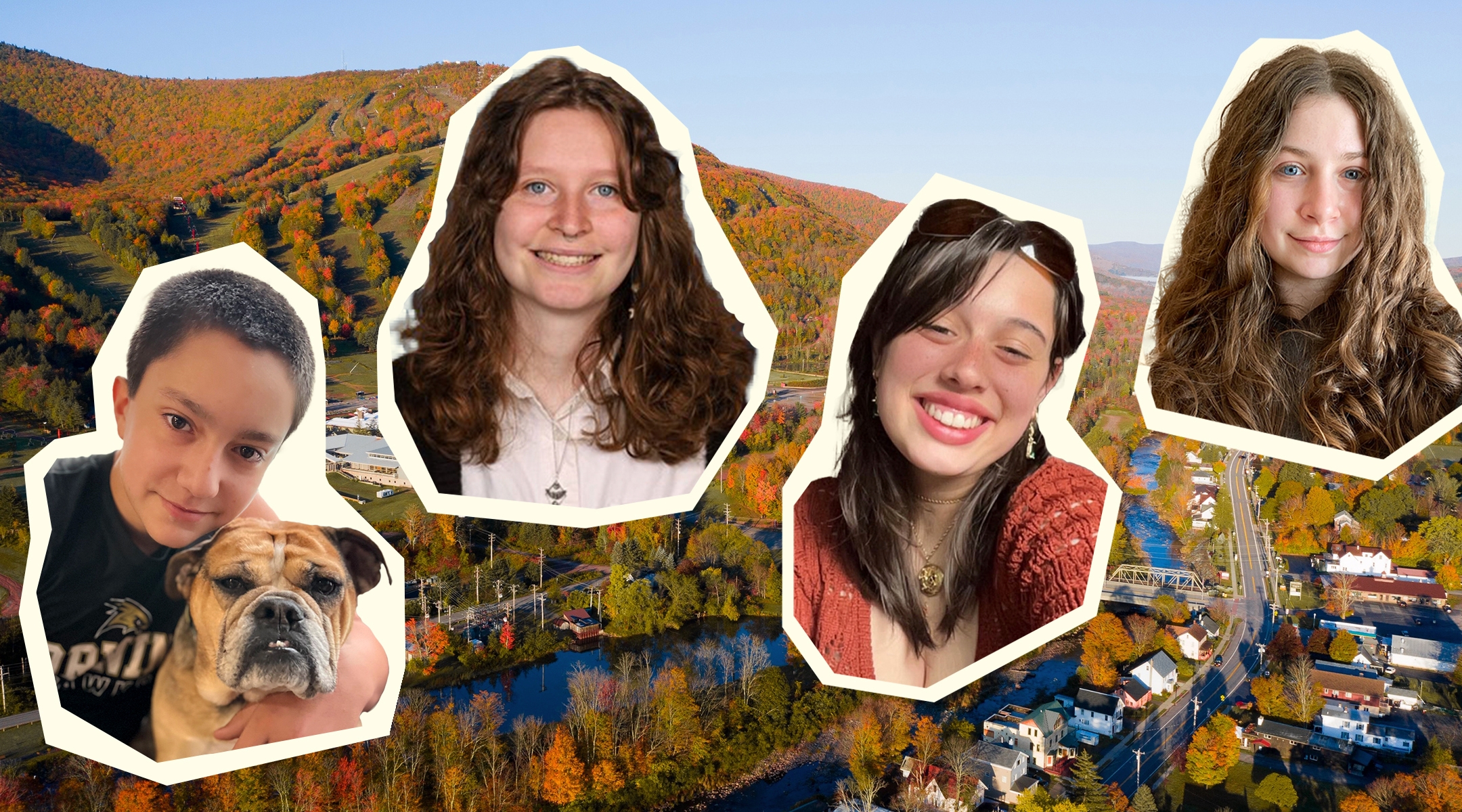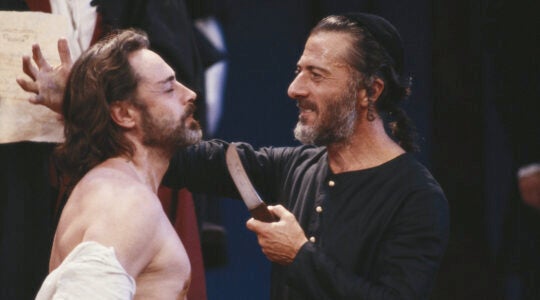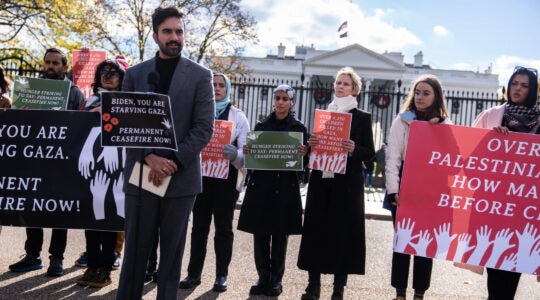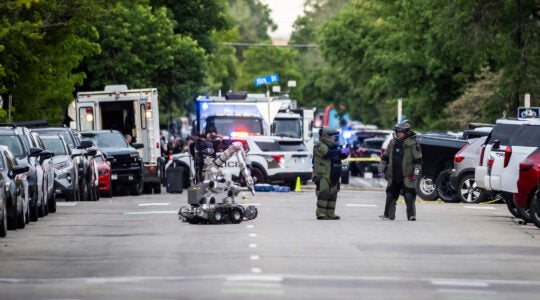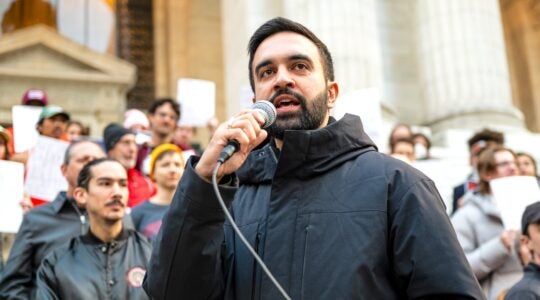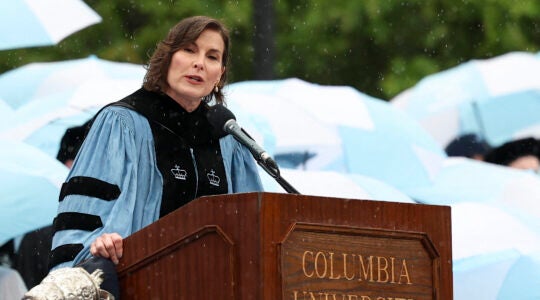This article was produced as part of JTA’s Teen Journalism Fellowship, a program that works with Jewish teens around the world to report on issues that affect their lives.
(JTA) — About 4.5 hours north of the country’s most Jewish-concentrated city, is Corning, New York. Though it’s technically considered a city, Corning is more of a town, with just about 11,000 people.
While the downtown area is fairly progressive, Confederate flags can be found flying in front of homes in towns just beyond, 10 minutes in any direction. Because of the primarily rural environment, the young Jewish community is small and largely disconnected. The closest synagogue to Corning, Congregation Kol Ami, is two towns away and its youngest member is 22 years old. Teen Jews in rural areas face the challenges of building their Jewish identity in areas with limited support, resources and opportunities.
The Jewish Telegraphic Agency interviewed four teens about their experiences of being young and Jewish in a small town. Three of the students attend Corning-Painted Post High School and one attends Corning-Painted Post Middle School. They spoke with JTA via Zoom on Oct. 29, three weeks into Israel’s war on Hamas. The unique Jewish identities they made for themselves are products of the environment they grew up in. In one way or another, their thoughts reflect how being raised in a rural area affected their relationship with Judaism.
JTA: For each of you, what’s your own personal connection with Judaism? In other words, describe your Jewishness.
Jonah Goldwyn, 13, Painted Post, New York: I got a Jewish education at Congregation Kol Ami for a few years every Sunday and so did my brother and sister. When the pandemic hit, it kind of fell apart because there’s not obviously not a big Jewish community around here, so classes were pretty small, there might have been four people in the class. But once the pandemic hit, we tried going virtual and that was kind of a disaster. We also tried connecting with a temple outside of Philadelphia and that was a little awkward. It was way too much screen time. Because of this, I didn’t get the same Hebrew education that my brother and sister got. Now, we go to temple and celebrate holy days. And we do a lot of holidays at home.
McKenna Kagle, 16, Caton, New York: My dad’s family is culturally Jewish and really connected with traditions and things like that. But my dad didn’t really pass it down to me. My family doesn’t really practice Judaism religiously at all. We try to do Hanukkah and sometimes we’ll do holidays with my grandparents. We used to go to the Jewish Food Festival every year when they had it at the temple in Elmira, but I don’t think they do it anymore. So I am connected but definitely not to the extent that I would like to be. I’d like to learn more about the culture, get more experience, and actually participate in holidays besides just Hanukkah.
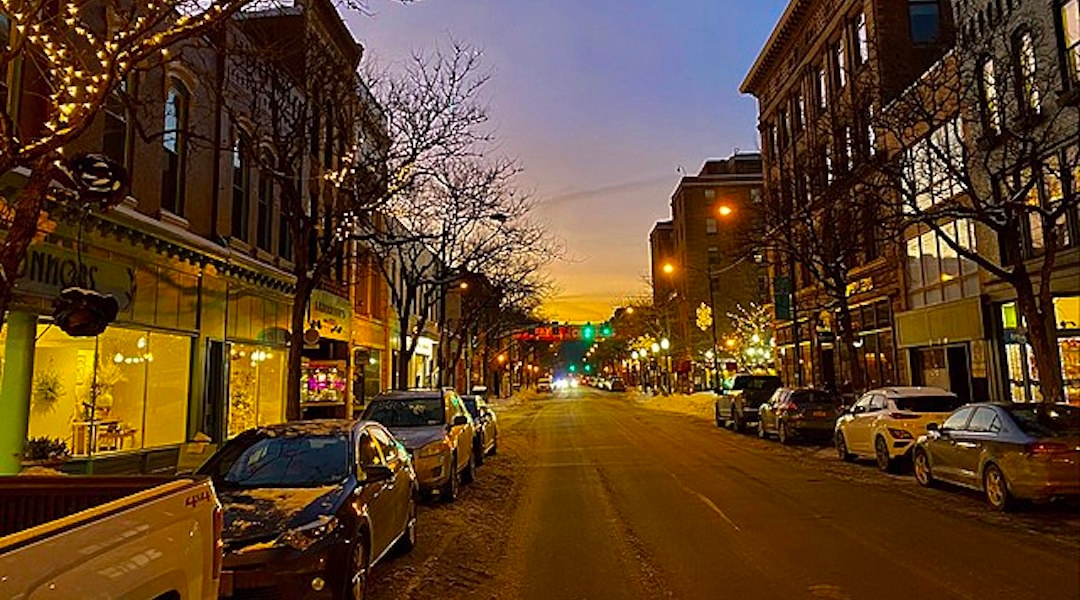
Historic Market Street in Corning, New York, seen in February 2022. (Andre Carrotflower/Creative Commons)
Abigail Alper, 17, Corning, New York: Both of my parents are Jewish, but we’re not practicing. We celebrate holidays like Passover and Hanukkah, but we don’t participate in the ones where you connect yourself with God, due to the fact that both of my parents were raised atheists. I still identify with Judaism even though we don’t practice. My grandfather was a Cohen and I believe that if circumstances were different, possibly I would be practicing; my parents were raised in environments that made them unable to practice and affected their relationships with Judaism. My dad didn’t know he was Jewish until high school and was raised Presbyterian. I think if he was raised with Judaism, we would be practicing more. My mom came from the Soviet Union and during that time, they weren’t even allowed to practice Judaism. Now, she’s very passionate with knowledge about the Torah because she went to a school later on to educate herself on it. And she even learned Hebrew fluently, but because she didn’t have anybody to speak it with in Corning, she forgot.
Dorothy Piech, 17, Hornby, New York: My mother is Jewish, and she went to temple occasionally growing up. But because she grew up in a really rural area in Maryland, she felt alienated because she didn’t celebrate Christian holidays. And I think she didn’t want that to be our experience as her kids. We do Hanukkah and Passover and sort of acknowledge that the other holidays exist, but mostly not the religious aspects; it’s more cultural. But I identify with Judaism because it’s just such a cultural part of my identity. We use like Yiddish phrases and have that sort of relationship with it.
Consider where you live and think about a larger, more urban city like New York city. How would you compare your own experiences with Judaism to theirs?
Piech: I have cousins who live in Westchester. They get school off for Rosh Hashanah and they have a Jewish Community Center. Even though they’re also not practicing, they have tons of friends who are Jewish and they went to a bunch of bat mitzvahs when they were that age. It’s just very different. I can’t imagine having that experience and not having to explain what being Jewish is like.
Alper: I keep seeing clips from, “You’re So Not Invited to My Bat Mitzvah,” the Adam Sandler movie, on my [TikTok] “for you” page. It’s a very new movie set in a place that has a large Jewish community. I’m like, “Dude, this is so different from my experience. I have never gone to a bar mitzvah.” It’s just so different.
Kagle: I mean, my grandparents live in New York City in a very Jewish area. It’s kind of crazy seeing like six temples in this little area. They just have so much more of an official Jewish community, and there’s none of that here.
Jonah, if you went to one of those bigger, more urban schools, would you appreciate having a larger Jewish community?
Goldwyn: Maybe. I don’t really think it would be that much better. I don’t need to be surrounded by people just because they’re the same.
What’s your high school Jewish population like?
Piech: It’s very small. I think people don’t talk about it because no one’s like, “Hey, what are you doing for Passover?” We just assume everyone else is Christian, because most of them are. I had a Jewish English teacher last year and he told us he wasn’t going to be in school one day because of Yom Kippur. And that was sort of crazy to me that he had to take a day off to celebrate his holiday even though we get days off for Easter and Christmas and things like that. But he was also the only teacher I’ve ever had who knows anything about Judaism. My mom went in and taught my elementary class about Hanukkah, and the teachers had no idea what to think. They were like “What is a latke?” And I was thinking, “You’re an adult.”
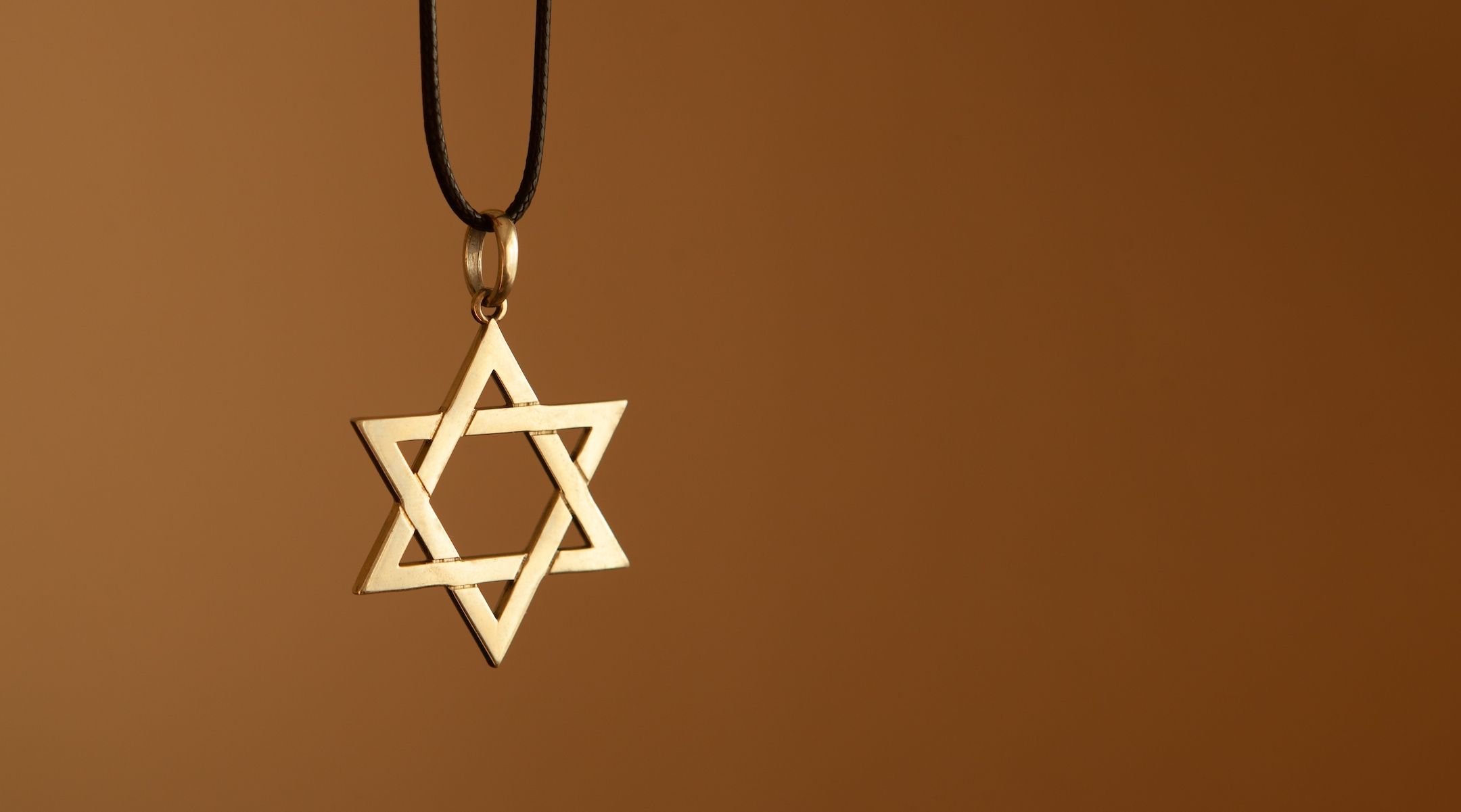
“I tuck my star [of David] under my shirt a lot. I usually wear it every day but lately, I’ve taken it off just because of everything that’s going on.” (Getty Images)
Alper: Even though there’s a lack of a Jewish community, whenever my connection to Judaism is mentioned, people that don’t know are genuinely interested. Even in elementary school where I would assume kids would know better, they were always like, “Whoa, what is Hanukkah — a second Christmas?”
What’s a frustration you have with your school’s education surrounding Judaism?
Alper: Everybody just knows about the Holocaust. Whenever there’s any mention of a Jew or Judaism, people kind of just look around awkwardly. When my literature teacher took off for Yom Kippur, he said that “it’s a very serious holiday” and everybody was like “what even is it?”
Kagle: We were reading “Night” by Elie Wiesel and one of my teachers misspelled it as “Knight,” like the soldier, instead of the time of day. It took her weeks to realize her mistake.
Can you think of a time when being Jewish made you feel “othered”?
Piech: A few years ago in English class, we read “Maus,” [Art Spiegelman’s graphic novel/memoir about the Holocaust]. During one class, we talked about Jewish stereotypes and I was trying to say something and I paused. And my teacher asked me if I paused because I didn’t want to offend anyone. And I remember that I didn’t know how to say what I wanted to because I didn’t know whether to say “they” or “we” when talking about Jewish people because I don’t want to bring that up.
Alper: I tuck my star [of David] under my shirt a lot. I usually wear it every day but lately, I’ve taken it off just because of everything that’s going on; I don’t know with a lot of people what their thoughts on Jews are. And I know that there is history in Painted Post of Nazi agendas. After World War II, there was this guy who painted a swastika on the ceiling of his house and then painted over it. So in one of the Painted Post houses, there is a Nazi swastika under the ceiling paint. You’ll see them in bathroom stalls, under bridges in graffiti, in a lot of places. I think some kids do it because they think they are being quirky or funny. It’s crazy. It’s actually crazy.
Kagle: I forgot about this but last year in my biology class I sat at a table that literally had like 30 swastikas carved into it. I was shocked. I mean I feel like it’s a pretty common thing to graffiti, but the fact that nobody had done anything about it was crazy. That was the place I sat every single day and I had to look at those hate symbols every single day. It was unnerving.
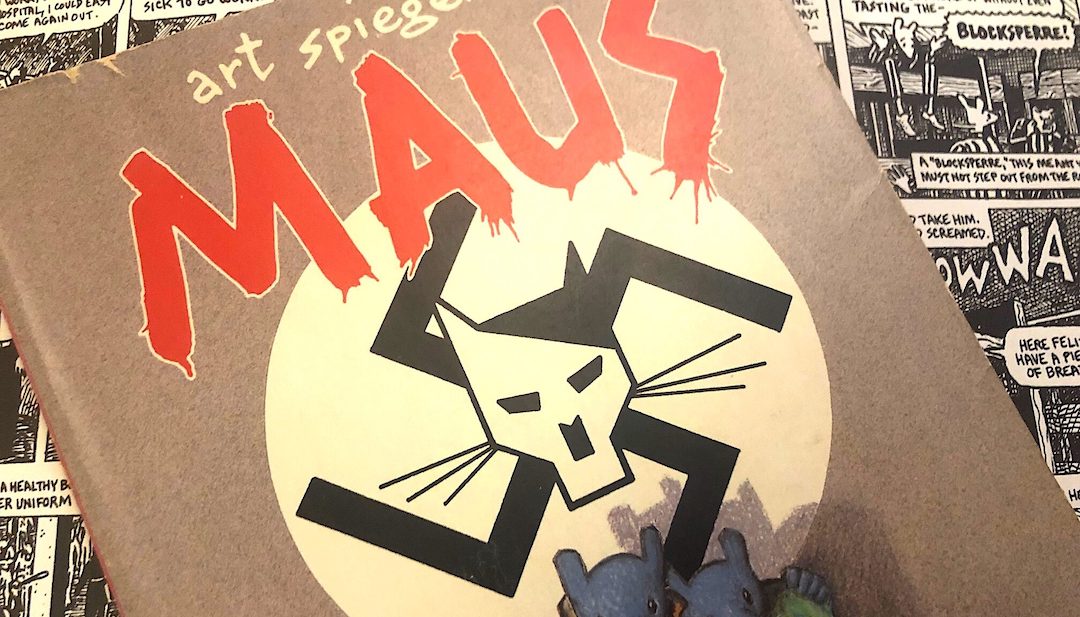 Art Spiegelman’s “Maus” is a Pulitzer Prize-winning memoir about the Holocaust in the form of a two-volume comic book. (Philissa Cramer)
Art Spiegelman’s “Maus” is a Pulitzer Prize-winning memoir about the Holocaust in the form of a two-volume comic book. (Philissa Cramer)
What are your experiences with the conflicts in Israel?
Alper: Mostly what has affected and unnerved me is you hear about antisemitism and people protesting against Jews as a whole. I don’t agree with war in general — war to me is just so unprogressive — but there’s a lot of new prejudice surfacing. It’s crazy to think that right now I can tell somebody that I am a Jew and they might think that I’m dangerous or against Palestine when Islam, Judaism and Christianity are all Abrahamic religions.
Kagle: I have a lot of feelings about this. But I think to me, it’s kind of crazy how many people equate supporting Palestine with antisemitism. Because, without a doubt, Palestinian people are being completely oppressed and have been for years and it’s not antisemitic to say that the state of Israel is doing bad things. And so many people and politicians are saying that they stand with the Jewish community, but that doesn’t mean you have to stand with the state of Israel.
Piech: I don’t support it. I’m against the conflict in the same way Abby is. But people use it as an excuse for antisemitism. There was another conflict a couple years ago and antisemitic activity was on the rise then too. Just because there’s a majority Muslim country and a majority Jewish country fighting, that doesn’t mean you can use that to attack members of either religion.
Do you see yourself staying in a rural area or moving to an urban one?
Goldwyn: I want to live in a city after high school or college, not because of Judaism, but it would be good in that regard too. If I have kids, I’d probably move to somewhere that still has a few temples around it because that’s important to me; it gives some structure. I think it’s good to use religion to help decide what you think about the world. If you don’t have any knowledge on that, then you won’t have good ideas. A verse could change how you view the world. A lot of it is true, and a lot of it is smarter than what people think. I would want that for my kids, if I decide to have them.
Alper: I probably would pick a place where there’s more of a Jewish presence, just so I can educate myself more on who I am. I personally love religion, I think religion is so interesting as a concept. It’s how we find the world as humans, and I would love to learn more about my culture.
Piech: Because I’m a senior, my plan right now is to go to Boston for school. Being a larger city, I would love to have some connection with the campus hillel and with the Jewish community, just to surround myself with people who understand that part of my background. If I have kids, it would be important to me to educate them and teach them about their culture. I also want to make sure that they never feel ashamed or alienated because of it.
Kagle: I don’t think I’m necessarily going to choose where I live based on Judaism, but I definitely want to go to a big city, and with that, there will come connections to Judaism.
JTA has documented Jewish history in real-time for over a century. Keep our journalism strong by joining us in supporting independent, award-winning reporting.
